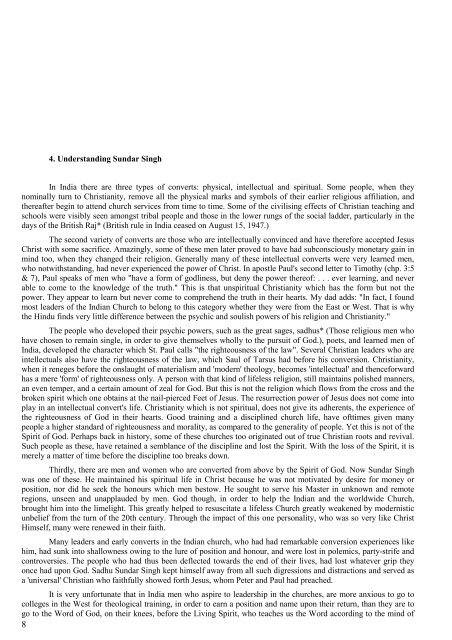Sadhu Sundar Singh A Biography
Sadhu Sundar Singh A Biography
Sadhu Sundar Singh A Biography
Create successful ePaper yourself
Turn your PDF publications into a flip-book with our unique Google optimized e-Paper software.
4. Understanding <strong>Sundar</strong> <strong>Singh</strong><br />
In India there are three types of converts: physical, intellectual and spiritual. Some people, when they<br />
nominally turn to Christianity, remove all the physical marks and symbols of their earlier religious affiliation, and<br />
thereafter begin to attend church services from time to time. Some of the civilising effects of Christian teaching and<br />
schools were visibly seen amongst tribal people and those in the lower rungs of the social ladder, particularly in the<br />
days of the British Raj* (British rule in India ceased on August 15, 1947.)<br />
The second variety of converts are those who are intellectually convinced and have therefore accepted Jesus<br />
Christ with some sacrifice. Amazingly, some of these men later proved to have had subconsciously monetary gain in<br />
mind too, when they changed their religion. Generally many of these intellectual converts were very learned men,<br />
who notwithstanding, had never experienced the power of Christ. In apostle Paul's second letter to Timothy (chp. 3:5<br />
& 7), Paul speaks of men who "have a form of godliness, but deny the power thereof: . . . ever learning, and never<br />
able to come to the knowledge of the truth." This is that unspiritual Christianity which has the form but not the<br />
power. They appear to learn but never come to comprehend the truth in their hearts. My dad adds: "In fact, I found<br />
most leaders of the Indian Church to belong to this category whether they were from the East or West. That is why<br />
the Hindu finds very little difference between the psychic and soulish powers of his religion and Christianity."<br />
The people who developed their psychic powers, such as the great sages, sadhus* (Those religious men who<br />
have chosen to remain single, in order to give themselves wholly to the pursuit of God.), poets, and learned men of<br />
India, developed the character which St. Paul calls "the righteousness of the law". Several Christian leaders who are<br />
intellectuals also have the righteousness of the law, which Saul of Tarsus had before his conversion. Christianity,<br />
when it reneges before the onslaught of materialism and 'modern' theology, becomes 'intellectual' and thenceforward<br />
has a mere 'form' of righteousness only. A person with that kind of lifeless religion, still maintains polished manners,<br />
an even temper, and a certain amount of zeal for God. But this is not the religion which flows from the cross and the<br />
broken spirit which one obtains at the nail-pierced Feet of Jesus. The resurrection power of Jesus does not come into<br />
play in an intellectual convert's life. Christianity which is not spiritual, does not give its adherents, the experience of<br />
the righteousness of God in their hearts. Good training and a disciplined church life, have ofttimes given many<br />
people a higher standard of righteousness and morality, as compared to the generality of people. Yet this is not of the<br />
Spirit of God. Perhaps back in history, some of these churches too originated out of true Christian roots and revival.<br />
Such people as these, have retained a semblance of the discipline and lost the Spirit. With the loss of the Spirit, it is<br />
merely a matter of time before the discipline too breaks down.<br />
Thirdly, there are men and women who are converted from above by the Spirit of God. Now <strong>Sundar</strong> <strong>Singh</strong><br />
was one of these. He maintained his spiritual life in Christ because he was not motivated by desire for money or<br />
position, nor did he seek the honours which men bestow. He sought to serve his Master in unknown and remote<br />
regions, unseen and unapplauded by men. God though, in order to help the Indian and the worldwide Church,<br />
brought him into the limelight. This greatly helped to resuscitate a lifeless Church greatly weakened by modernistic<br />
unbelief from the turn of the 20th century. Through the impact of this one personality, who was so very like Christ<br />
Himself, many were renewed in their faith.<br />
Many leaders and early converts in the Indian church, who had had remarkable conversion experiences like<br />
him, had sunk into shallowness owing to the lure of position and honour, and were lost in polemics, party-strife and<br />
controversies. The people who had thus been deflected towards the end of their lives, had lost whatever grip they<br />
once had upon God. <strong>Sadhu</strong> <strong>Sundar</strong> <strong>Singh</strong> kept himself away from all such digressions and distractions and served as<br />
a 'universal' Christian who faithfully showed forth Jesus, whom Peter and Paul had preached.<br />
It is very unfortunate that in India men who aspire to leadership in the churches, are more anxious to go to<br />
colleges in the West for theological training, in order to earn a position and name upon their return, than they are to<br />
go to the Word of God, on their knees, before the Living Spirit, who teaches us the Word according to the mind of<br />
8


